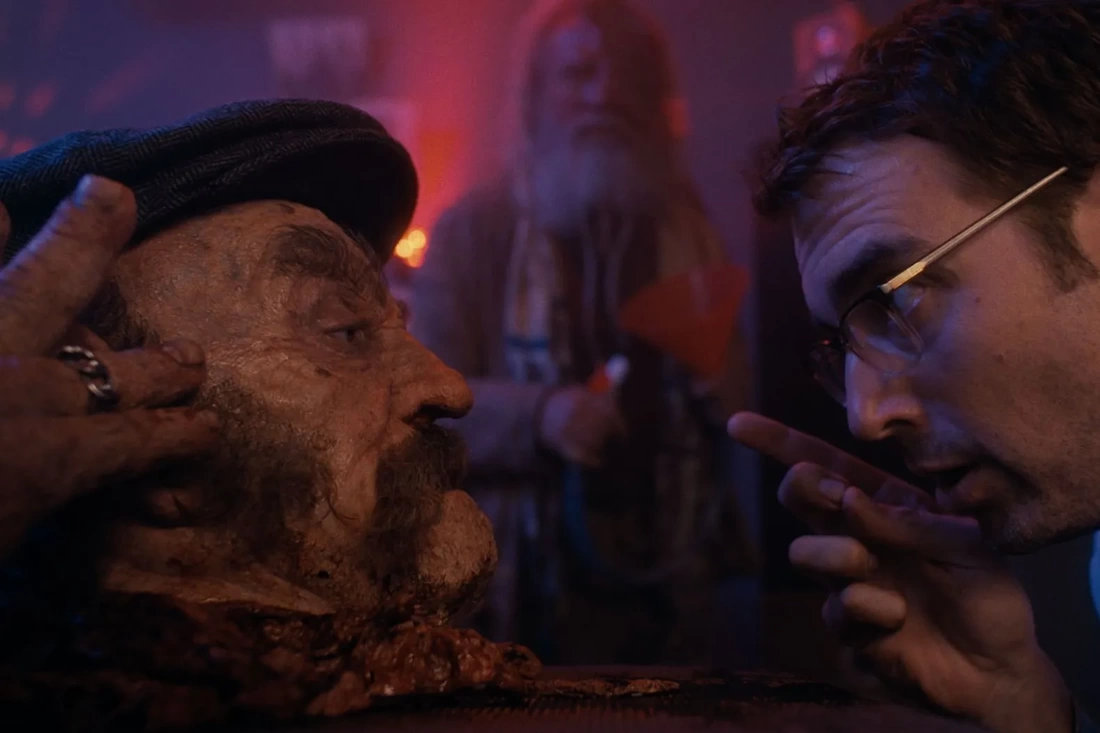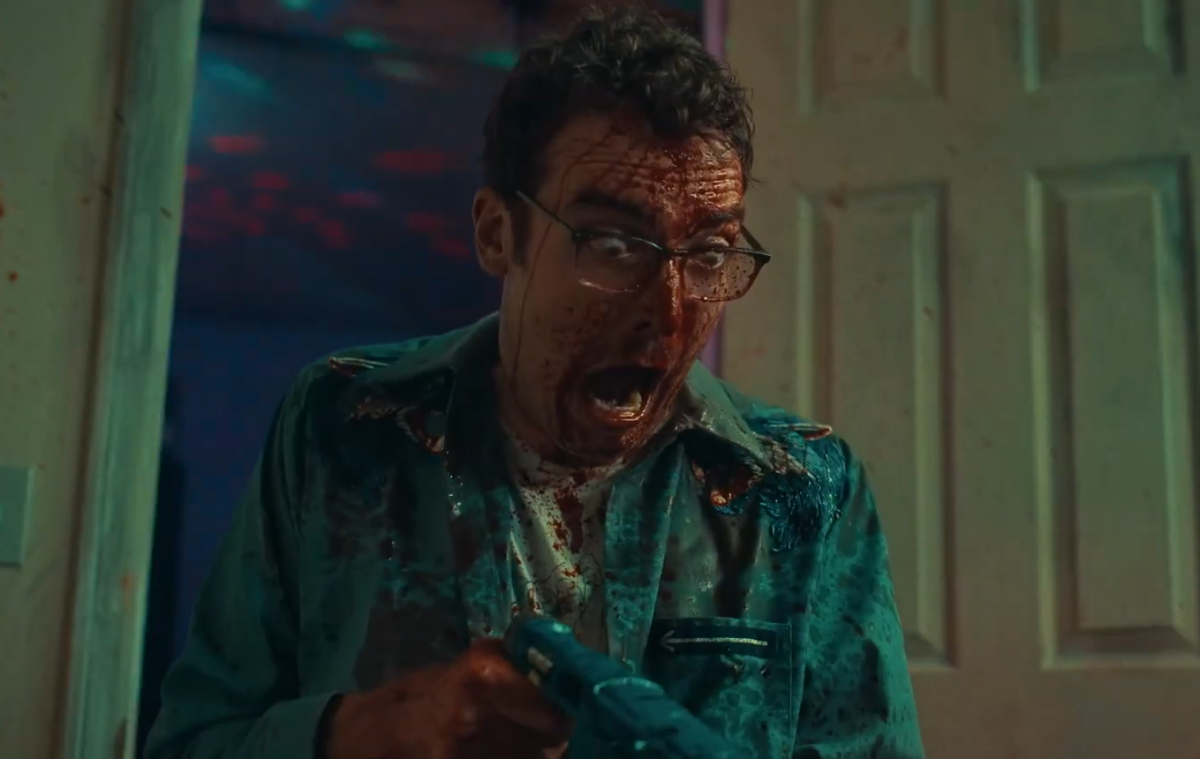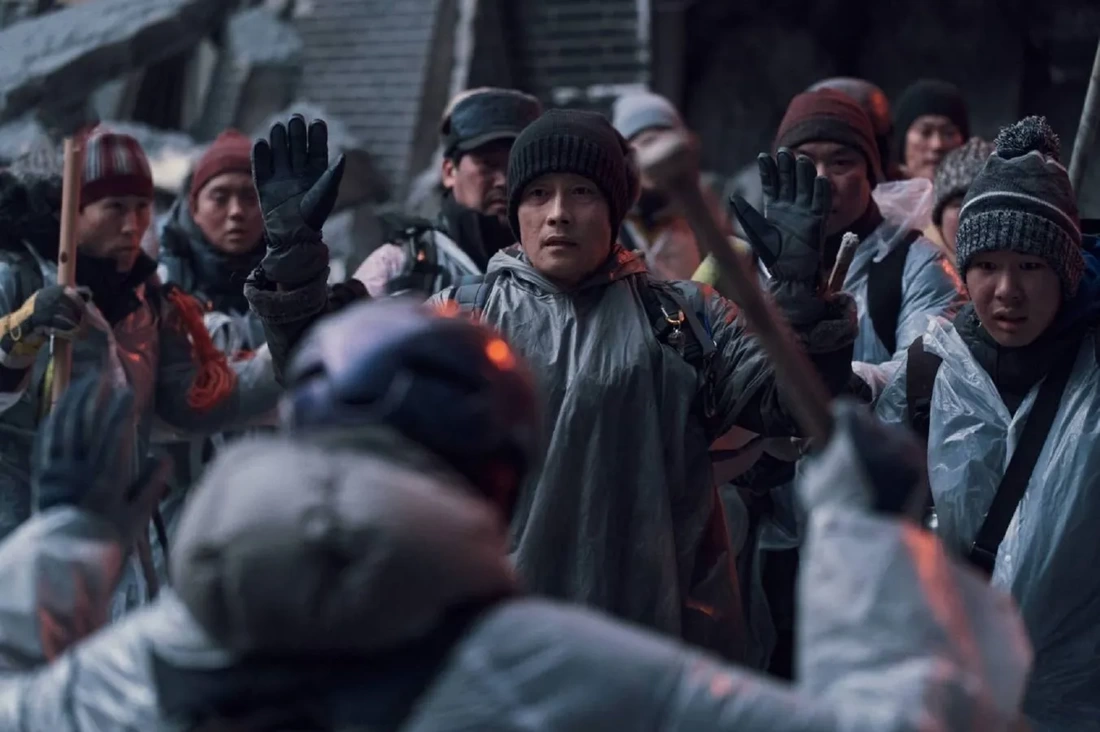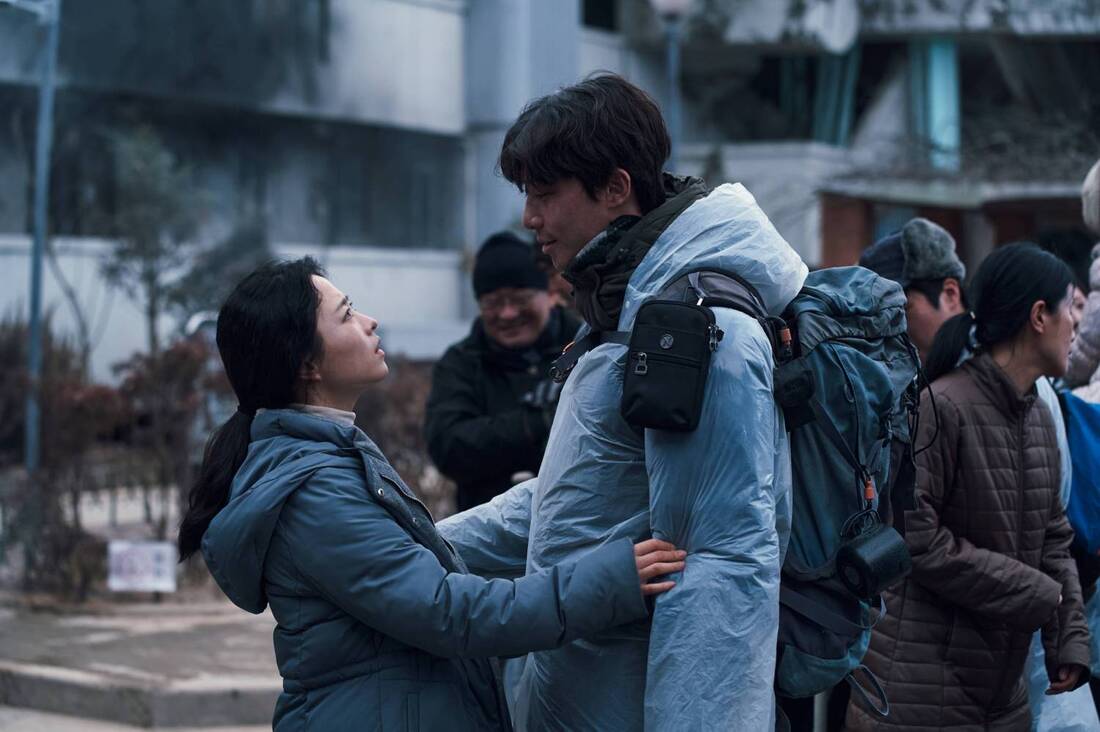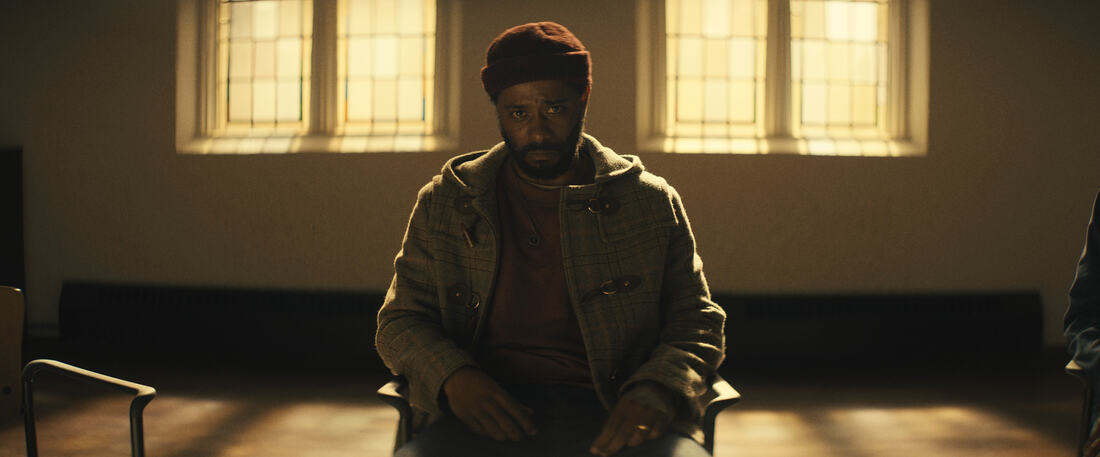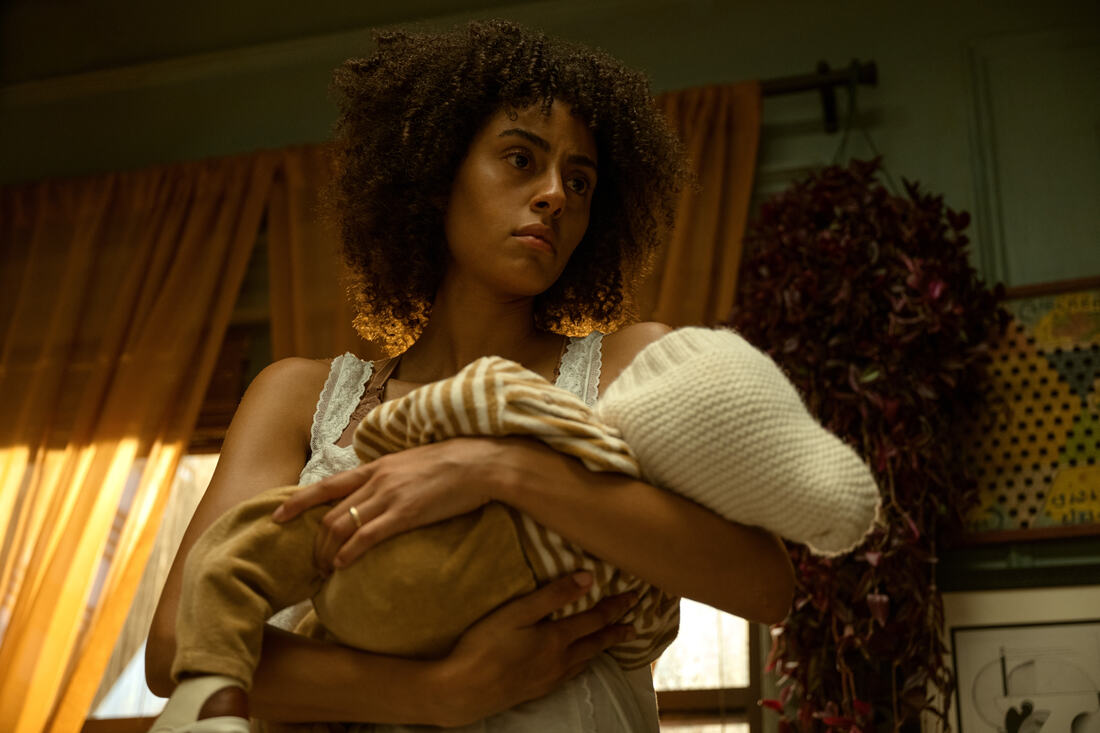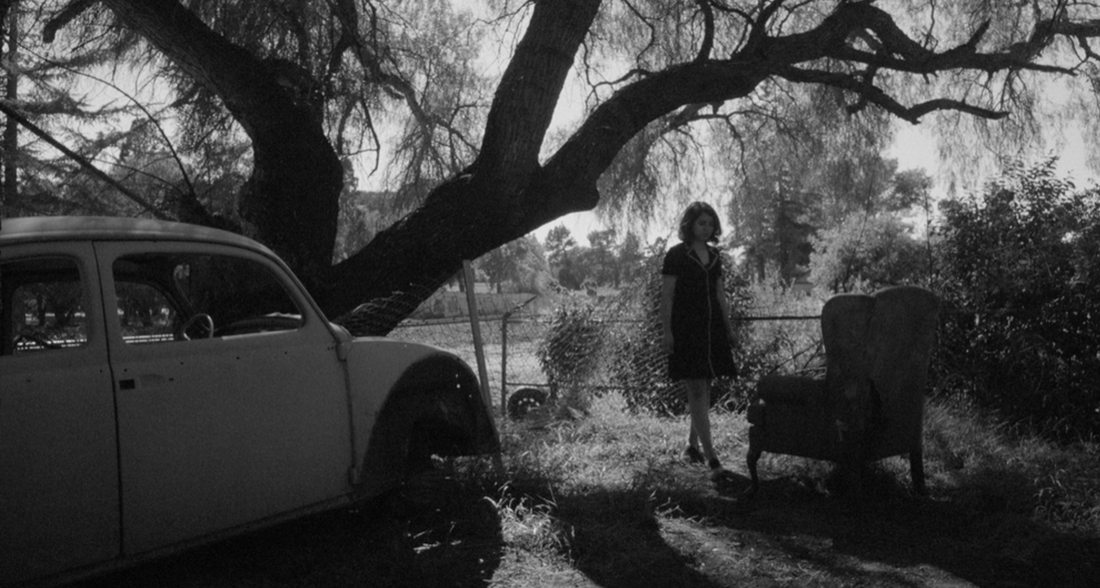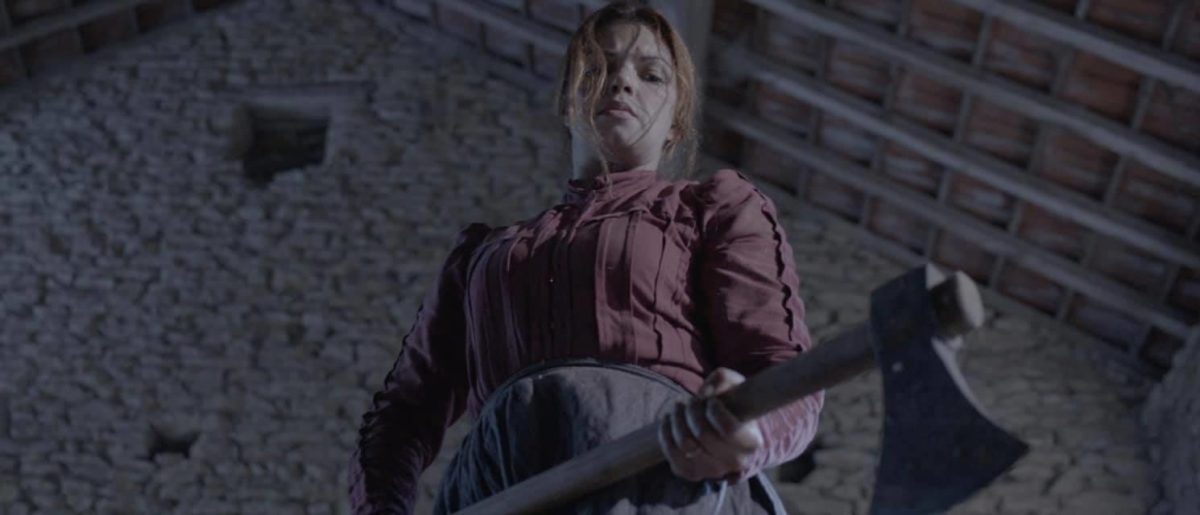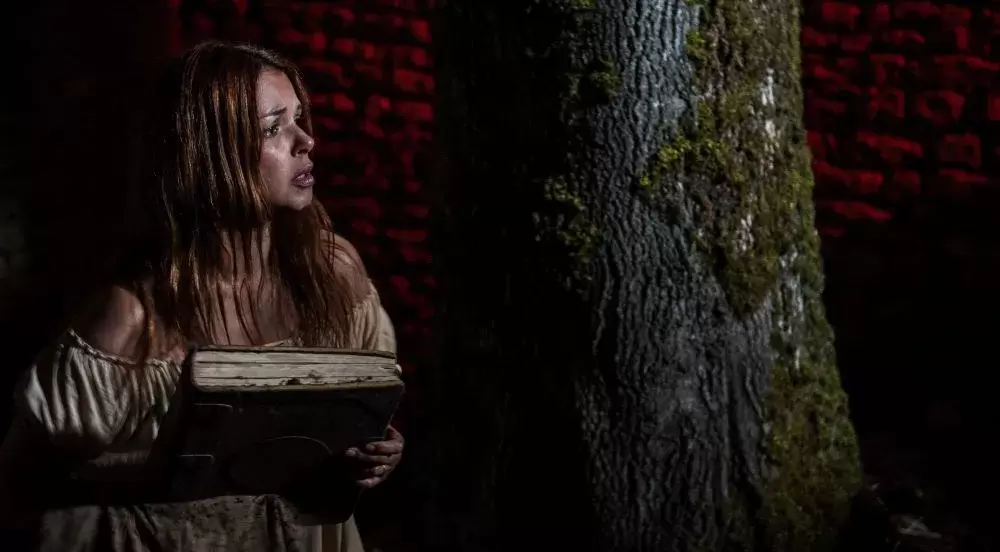|
Review by Erin M. Brady I have a confession to make: I typically hate horror comedies. The vast majority of them often fall flat to me, whether because of unfunny humor or awkward tone imbalances. This could be attributed to me not finding many comedies that funny either, but I do have to admit that they sometimes work their charms. Such is the case with Josh Forbes’ Shudder original Destroy All Neighbors. While perhaps not consistently hilarious and thin-plotted, its charmingly ragtag nature is hard to resist. Will (Jonah Ray Rodrigues) just can’t seem to finish the progressive rock album he has been working on for three years. His perfectionism has not only put a strain on his relationship with his lawyer girlfriend, Emily (Kiran Deol), but it has also affected how he interacts with others in his life. This self-imposed anxiety comes to a head when a mysterious old man named Vlad (Alex Winter, in a truly transformative role) moves in next door. After a life-altering confrontation, Will finds himself haunted — and maybe even inspired — by the undead. What’s important to note about this film is its universal understanding of what it actually is. From the visual aesthetic of the movie to the delivery of its performances, Forbes strikes a near-perfect balance in tone here. It embraces its corny, Creepshow-meets-This is Spinal Tap premise while also pulling back when it becomes too much. This flow, buoyed by a smart script, makes the film much more palatable and interesting to watch than some other horror comedies. However, the thing that will truly make this picture stand out is, well, how it’s pictured. The set design and practical effects are some of the best that have come from a Shudder original, helping the viewer settle into its uncanny reality. One particular puppet is perhaps too spoilery and gruesome to elaborate on here. Still, viewers with a keen eye for visual effects will likely want to pause throughout to admire the details. The visual effects arguably make the movie as memorable as it is due to how naturally they fit in the world that Forbes has established.
Of course, you can’t have a fully realized world without fully realized characters. Unfortunately, this aspect of the film is where things aren’t so great. While Rodrigues once again proves himself to be a formidable leading man, something is missing to Will as a character that makes him feel incomplete. It’s difficult to pinpoint, but once the credits start to roll, viewers will likely get the same feeling of wanting to fully understand the character. You can easily say the same thing about the other characters, especially those that meet gruesomely entertaining ends — they just miss some form of proper characterization and development that would be critical to making the film feel complete. Regardless, it can’t be denied how Destroy All Neighbors is already one of the year’s biggest surprises. If you’re looking for something punchy and fun to pass the time this weekend, it’s the perfect choice for any horror fan. Just don’t watch it too loud unless you want your neighbors pounding on your wall. Destroy All Neighbors is now streaming on Shudder. Rating: 3/5
0 Comments
Review by Erin M. Brady It’s hard to make an effective dramatization of the opioid crisis. As seen in recent examples, such as Hulu’s Dopesick and Netflix’s Painkiller, it is extremely easy to turn the suffering of millions into a melodramatic spectacle. Both limited series depict the spiral of opioid addiction to an almost torture porn-esque level. It might be easy to assume that Netflix’s other release on the subject matter, Pain Hustlers, would be similar, but surprisingly, it isn’t. That doesn’t necessarily make it a step forward in depicting the opioid crisis in media, though. Liza (Emily Blunt) is a high school dropout working at a strip club to care for her daughter, Phoebe (Chloe Coleman). At the club, she has a chance encounter with sleazy salesman Pete (Chris Evans), who drunkenly offers her a job at the pharmaceutical startup he works at. Once hired through illicit means, she reinvigorates the startup’s sales model, catapulting its pharmaceutical fentanyl drug into nationwide usage. Unfortunately, the realities of the drug’s usage, combined with increasingly shady business tactics, threaten to destroy Liza’s life. Inspired by the real-life racketeering scandal that destroyed Insys Therapeutics, the film’s decision to focus on the lives of opioid salespeople and executives makes it surprisingly engaging. It’s certainly an easier watch than the aforementioned miniseries that came before it, but director David Yates reaffirms the human cost of the opioid crisis in small and impactful ways. Yates — who returns to non-franchise filmmaking here after years of spearheading the Wizarding World films — counteracts the depictions of corporate greed with these barely fictional moments of reality. It’s oddly refreshing, given how it spares viewers from having to endure more borderline-offensive portrayals of addicts to get the message across. However, this refreshing angle is probably the only thing about the film that feels wholly unique. The film is very reminiscent of both Adam McKay and Craig Gillespie’s works, and you wouldn’t be wrong to think either of them had a role in bringing it to life. This even seeps into the way Yates directs his actors, with Evans hamming his lingo and insult-laden dialogue up with a truly bizarre accent. Blunt is more subtle in her role, but the film’s strange pacing undermines this by making her motivations seem as if they are suddenly appearing out of thin air. The same can also be said for its bizarre stylistic choices, such as its obsession with freeze frames and scene flashbacks.
Pain Hustlers's script, written by author Wells Tower, also has shades of blue-collar Succession in it to mixed results. It is evident that the film wants audiences to question their sympathies and resentments toward Liza and the other characters. Unfortunately, this reaction doesn’t feel warranted due to how one-dimensionally they are written. Even the mother-daughter dynamic between Liza and Phoebe feels like an afterthought to a story that doesn’t really exist. While Blunt and Coleman have great chemistry together, it’s not enough to elevate their character’s poorly fleshed out relationship. This demonstrates the film's main issue: it is aggressively fine and inoffensive, but thinks it’s smarter than it actually is. Unfortunately, a mediocre film that thinks itself as better than it actually is is arguably worse than a bad one. Pain Hustlers is not a melodramatic sob story like other dramatizations of the opioid crisis, which is objectively a good thing. Unfortunately, that doesn’t make up for how strangely generic it ends up being. There are simply too many small, yet strangely distinguishable decisions that drag it down and make it an instantly forgettable watch. Perhaps this is a sign that there are just some real-world events that don’t translate well in a scripted work of fiction, and should instead be thoughtfully explored in the documentary format. Pain Hustlers is now in theaters and streams on Netflix beginning October 27. Rating: 2/5
Review by Erin M. Brady
The King James Bible translates Matthew 22:39 as “And the second is like unto it, Thou shalt love thy neighbor as thyself.” This verse essentially means that whatever you do to your neighbor, whether it’s through words or actions, needs to be something you want to have happen to you. This is especially true in times of unexplainable hardship, and while it is never outright stated, it is arguably the core idea of Um Tae-hwa’s disaster epic Concrete Utopia. If you do not know and love your neighbor as an equal, damnation will eventually come for you.
The film centers around the various residents of the Hwang Gung Apartments in the aftermath of a devastating earthquake. The apartment building was somehow completely undamaged, making it a safe haven for survivors, much to the dismay of its residents. One such resident, Yeong-tak (Lee Byung-hun), is voted to take charge due to his past advocacy against unwanted development on the apartment grounds. Unfortunately, his leadership successes come at a devastating cost, especially after nurse Myeong-hwa (Park Bo-young) fails to convince her husband, Min-seong (Park Seo-joon), that something is wrong. It would be remiss to ignore the stunning visual work that brought its destroyed Seoul landscape to life. One scene, in particular, will likely go down as one of the best ever made in the subgenre. Cinematographer Cho Hyung-rae crafted stunning shots in this grey, desolate, and horrifying environment, even in parts where the integration of CGI green screen and physical sets isn’t perfect. However, these sequences aren’t the main draw of the film, and much is still left to the imagination as to what actually happened. Choosing to center the movie around the aftermath of the earthquake is not a particularly unique direction – often, disaster movies highlight the degradation of the human condition as proof that we’re all capable of horrific violence under the right circumstances. How these characters degrade certainly is. They never become cartoonishly evil or desperate, as is usually the case with similar stories. They simply act like people wanting to maintain the order they previously had in their lives, no matter what they do to regain it.
Herein lies the film’s biggest strength: nuance. There is, for lack of a better term, a concrete reason behind every decision made by its ensemble. Lee Byung-hun’s performance is arguably the best example of this, as Yeong-tak’s rise to power within the complex coincides with a much darker secret he’s hiding. When this secret is revealed, it is juxtaposed with scenes of what is supposed to be a joyous celebration of survival. This is the perfect example of who Yeong-tak is as a character: someone who knows of his sins but will continue to reap the benefits they have given him. Audiences can judge him and the rest of these characters, but not without wondering if they themselves are capable of acting the exact same way.
Um’s direction, along with the script he co-wrote alongside Lee Sin-ji, exemplifies this overarching idea in every scene. In this regard, it is likely the most realistic depiction of what would happen if a disaster movie came to life, right down to the minute details of how its characters exist in this new world. If the world they existed in valued property and materialism above all else (a detail outlined to us in the opening credits), it’s only reasonable that these attitudes would carry over into times of crisis. Concrete Utopia is both pessimistic and optimistic about the state of humanity in extreme events. There is never any reason for why the apartment complex was spared, nor do we ever get any answers as to why larger help hasn’t come. However, these aren’t questions you are supposed to ask about this film. Instead, you’re supposed to ask yourself if you are as morally righteous as you think you are, the film challenging the audience at every revelation and development. By fully immersing viewers into the lives of its ensemble, it forces you to think about how you treat your neighbors, both figuratively and literally. Will you be the one helping outsiders survive in difficult conditions, or will you be the one throwing objects at them to get them to leave? Can you be sure of your answer? Concrete Utopia is screening at the 2023 Fantastic Fest, which runs September 21-28 in Austin, Texas. Rating: 4/5 Review By Erin M. Brady Navigating how to accurately depict the aftermath of childbirth will always be difficult. There are many different perspectives and biological results that one must consider. Apple TV+’s The Changeling, based on Victor LaVelle's novel of the same name, represents one such approach: heightening the uncertainty of postpartum life through the lens of witchcraft. Book dealer Apollo (LaKeith Stanfield) finds love with librarian Emma (Clark Backo), with that love culminating in the birth of their son. However, that love turns sour after the two of them lift a curse placed upon Emma while on an excursion to Costa Rica, and in the aftermath, Apollo becomes determined to find out the truth. That is probably the best description one could give without diving into major spoilers. Showrunner and writer Kelly Marcel knows how to handle such a densely-constructed premise. Elevated by the show’s main directors, Melina Matsoukas and Jonathan van Tulleken, the world that the show is set in feels both distant and intimately well-worn. It’s uncanny, but not in a distracting way – rather, its uncanniness in parallel to our reality makes the denseness of the story more palpable. It also helps that the set design, courtesy of Lester Cohen, is just so well-constructed that it’s hard not to be immersed in its world, even if you might not be sure what’s happening in it. The performances also helped elevate the show significantly. There is a certain creepiness to how most of the actors, including a magnetic Stanfield, act in this universe that almost makes them feel alien. However, their humanity is reaffirmed with every scene, something that many modern riffs on magical realism seem to lack. Even in moments that are hard to stomach, nothing and no one is depicted in a dehumanizing light. Nowhere is this more apparent than in Backo’s stellar performance as Emma. Those who know her as the sardonic lover of the toughest guy in Letterkenny will be surprised by how much breadth she brings to this challenging role. The show would not work at all without her, as she brings much-needed grounding to the dense storyline.
It’s difficult to dissect The Changeling in such broad terms, especially since the show will follow a weekly release schedule – there is only so much that can be discussed without risking the chance of spoilers. At the same time, though, you will need the extra time to dissect the series and its proceeding events. It’s not a show that should be binged but rather savored to get the best viewing experience. Just remember that not everything is as it seems. The Changeling premieres on Apple TV+ on September 8 with its first three episodes before releasing weekly. All eight episodes reviewed. Rating: 4/5 Review by Erin M. Brady If you have ever found yourself in a life-altering event, you likely know how isolating it is to adjust to normalcy. It is even more isolating if you are an immigrant trying to start over in the supposed land of opportunity. This best describes Donya (Anaita Wali Zada), the subject of the surprise festival hit Fremont. She lives a simple, if not suffocating, life. She works at a fortune cookie factory and often spends her evenings alone or as the sole patron of an Afghan restaurant. However, when she receives an unexpected job opportunity, Donya decides to take charge of her life in her own way. Fremont -- the fourth feature by director Babak Jalali — is a quietly fascinating look at what is considered truly American. So much of how Donya moves around each frame is influenced by her past as a translator for the armed forces in Afghanistan. It is incredible that this film marks Zada’s screen debut, considering how poignant of a presence she is. Her stoic expressions come across as more forced than natural, and each of her lines is delivered so realistically that it’s hard to imagine that she’s acting. It’s hard to imagine the film working without her specifically as its lead, as so much of what makes Fremont work comes back to her. That isn’t to say there aren’t other aspects of the film worth highlighting. The black-and-white coloring amplifies Donya’s isolation in her surroundings, making the environments she navigates even lonelier than they already are. This coloring also makes even simple artistic shots feel impactful in a way that harks back to the early films of Jim Jarmusch.
However, directly comparing Jalali to Jarmusch would be a disservice to how uniquely composed Fremont is. It is not a particularly exciting or fast-paced film, but it doesn’t set out to be. It instead wants to show how unremarkable the American Dream really is, and how it isn’t the end-all-be-all for immigrants that people make it out to be. The film, which Jalali also co-wrote alongside Carolina Cavalli, sometimes bangs this message over the viewer’s head, but not without good reason. It’s not a takedown nor a glorification, but something more deceptively mundane: it's simply a look into one Afghan woman’s perspective. All she wants is to sleep at night, and even if she isn't convinced she's traumatized, it's a noble dream to have. Fremont arrives in theaters on August 25. Rating: 4/5 Review by Erin M. Brady Folk horror is arguably one of the most influential, yet somehow underrated subgenres of horror out there. There is so much a movie can explore regarding humanity’s place in nature and what it truly means to be alive. At first glance, it appears Fabrice Blin’s French horror The Thing Behind The Door would be the same. Set in the midst of World War I, young widow Adèle (Séverine Ferrer) goes to extreme and mythical lengths to see her husband Jean (David Doukhan) again. Unfortunately, it doesn’t amount to much outside of some cool visuals and appropriately gross practical effects. The issue with The Thing Behind The Door is simply that it is dull. There is no other way to describe it, despite the fact that its central premise is brimming with potential. There is a minute sense of love between Adèle and Jean, which would theoretically make for an interesting study into the limits of romance. Unfortunately, it falls flat in exploring these themes, likely due to its relatively short runtime of only 79 minutes. It is a film that needs far more exploration than what is actually given to viewers, but in its commitment to keep them on the edge of their seats, it forgoes it completely. In this regard, it’s quite similar to this past SXSW’s confounding midnight feature Aberrance. There is also the fact that the central performance of Adèle feels particularly hollow and one note. There isn’t much dialogue in The Thing Behind The Door, which could be an interesting narrative decision if utilized properly. The problem is that it isn’t, and this is largely due to Ferrer’s lack of a performance. Due to how lifeless and a non-presence Adèle is, the silence and lack of dialogue feel more like a cop-out than an intentional motif. The dialogue that is present in the script also feels stilted and awkward, although there is a chance this can be attributed to subtitle translation errors.
If there is one thing that prevents Blin’s film from being a total bore, it is the practical effects. The creature design and makeup are quite impressive, especially in how true it feels to its abandoned country setting. It isn’t outside the realm of possibility that the film’s creatures could live amongst the French countryside, and in a current landscape of CGI monstrosities, it’s refreshing to see creatures that are undoubtedly practical. It’s a shame that The Thing Behind The Door is the way that it is. A great concept and stellar practical effects set it up for success, but the lack of imagination and character direction hold it back from greatness. All of that being said, at least we have more folk horror being produced and released nowadays. The Thing Behind The Door releases on VOD on August 8. Rating: 2/5 |
Archives
July 2024
Authors
All
|
|
|
disappointment media
Dedicated to unique and diverse perspectives on cinema! |

